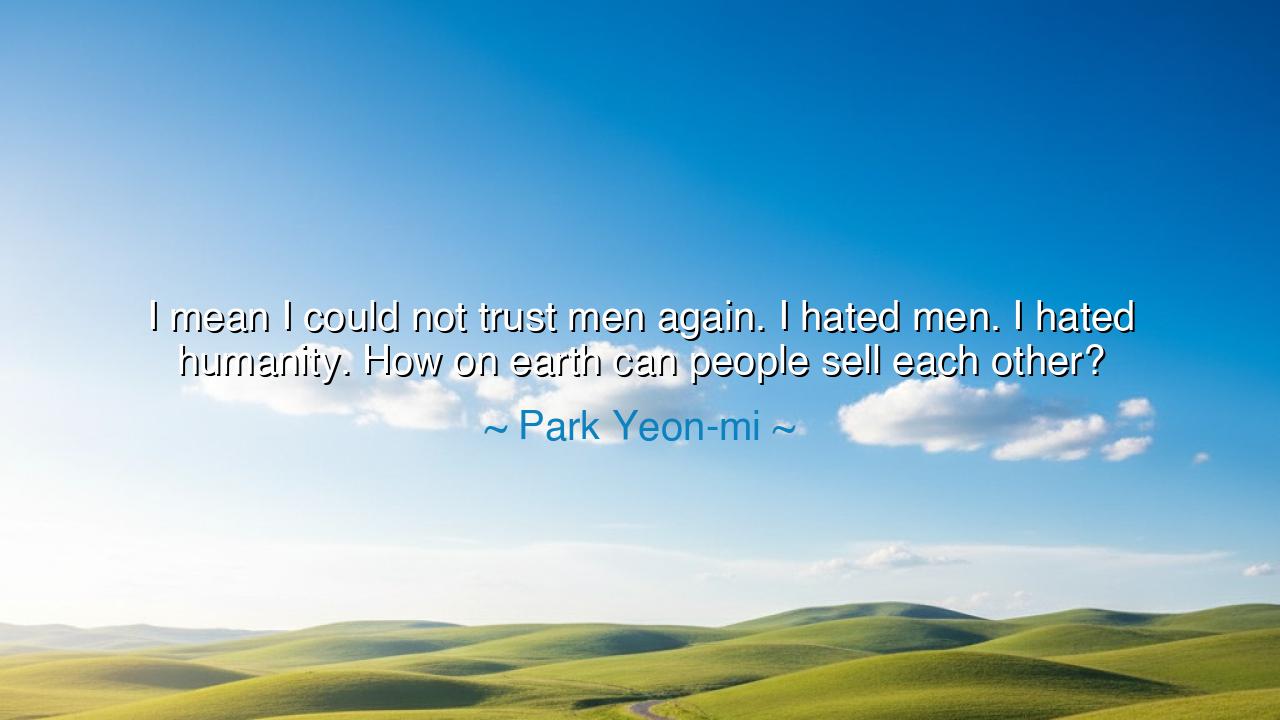
I mean I could not trust men again. I hated men. I hated
I mean I could not trust men again. I hated men. I hated humanity. How on earth can people sell each other?






“I mean I could not trust men again. I hated men. I hated humanity. How on earth can people sell each other?” Thus spoke Park Yeon-mi, who escaped the chains of tyranny and the shadow of human trafficking in her flight from North Korea. Her cry is not merely the lament of one individual but the voice of countless souls betrayed by their fellow man. In her words is the raw wound of betrayal—the collapse of trust, the bitter hatred born of exploitation, and the eternal question that has haunted every age: how can human beings sell one another?
The meaning of her words lies in the shattering of innocence. To be betrayed by strangers is one thing, but to be betrayed by the very fabric of humanity is another. When one discovers that a man, made of the same flesh and blood, will treat another not as a brother but as property, the soul recoils. Yeon-mi’s grief is not merely personal but universal. It declares that the trade of human lives is the ultimate desecration of what it means to be human. To hate humanity, in such a moment, is to respond honestly to the abyss of cruelty laid bare before her eyes.
The ancients too recoiled at such evil. In Greece and Rome, slavery was common, yet even philosophers like Seneca wrestled with its moral horror. He reminded his peers that slaves were not animals but men who “laugh, weep, and think.” And in the story of Joseph, sold by his brothers into slavery in Egypt, we see the anguish of betrayal not only by strangers, but by kin. The same cry Yeon-mi uttered—“how on earth can people sell each other?”—echoes from the pages of scripture and history alike.
History in our modern age repeats this sorrow. Consider the Atlantic slave trade, when millions of Africans were captured, sold, and shipped across the seas like cargo. Families torn apart, children sold from their mothers, men shackled in darkness—such deeds scarred not only those enslaved but the very soul of the nations who allowed it. The hatred, mistrust, and sorrow left behind still echo through generations. Yeon-mi’s words belong to this same lineage of pain, the lament of those who have seen humanity betray itself for profit or survival.
Yet within her cry also lies the seed of transformation. To hate humanity is the beginning of a journey, not its end. For those who survive such horrors, hatred can harden into despair—or it can be forged into witness. Park Yeon-mi chose the latter. By telling her story, she transforms her pain into a torch of truth, exposing cruelty so that others may see, act, and prevent its repetition. She shows us that though trust may be broken, the act of speaking truth can rebuild a different kind of faith—faith not in the perfection of humanity, but in its capacity to change.
The lesson is clear: we must never turn our eyes away from exploitation, for silence is complicity. Wherever one human is sold, betrayed, or enslaved, the humanity of all is diminished. To honor Yeon-mi’s testimony is to commit ourselves to vigilance: to defend the vulnerable, to resist the dehumanization of any soul, to ensure that no person is reduced to a commodity. We cannot undo the betrayals of the past, but we can build a future where dignity is upheld as sacred.
Therefore, children of tomorrow, remember this wisdom: though betrayal may cause you to hate humanity, do not let hatred be your final resting place. Let it awaken you, stir you, move you to act. See in the suffering of one the suffering of all. Work so that no child, no woman, no man will ever again utter Yeon-mi’s anguished cry. For humanity is redeemed not by words alone, but by the deeds of those who choose to honor life where others once sold it.






GDGold D.dragon
Park Yeon-mi’s quote really brings up a tough but important question—how do we recover from the profound betrayal that leaves us hating others? What does it say about human nature when someone feels this deeply hurt by others’ actions? Can we ever truly understand the depth of such feelings unless we’ve experienced similar trauma? How can society help those who feel completely disillusioned with humanity to heal and regain hope?
NTNhung Tran
It’s hard to fathom how intense the betrayal must have been for Park Yeon-mi to express such anger and despair toward humanity. But I wonder, is there a way to regain faith in people after enduring such cruelty? How does one begin to heal and open their heart again when the very core of their experience has been shaped by the worst of humanity? Can trust ever fully return after such pain?
HM26. Vu Thi Ha My
The pain in Park Yeon-mi’s quote really resonates with me. To go through something so painful that it leads you to hate an entire gender and humanity itself is profound. But I wonder, how do you move past such deep feelings of betrayal? How does one rebuild trust in a world where people can harm each other so deeply? What role does forgiveness play in this healing process, if at all?
TDtrung dinh
Park Yeon-mi’s words are incredibly powerful and heartbreaking. It’s difficult to imagine how betrayal and the harshness of the world can lead someone to feel such deep mistrust and hatred. What does it take for someone to rebuild trust in others after such experiences? Is it possible for someone to heal from such trauma, or does it leave scars that shape how you see humanity forever?